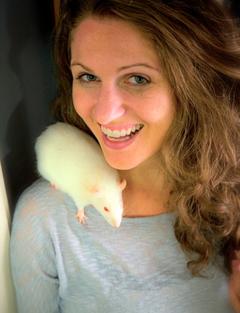Current Position:
Director, Jewish Initiative for Animals (JIFA)
What were you doing before entering the M.S. in Animals and Public Policy (MAPP) program?
Prior to MAPP, I was mostly working as an educator and in spiritual leadership in the Jewish community. Over the years, I was also a volunteer at various animal rehabs and shelters.
What aspects of MAPP led to your decision to join the program?
On a professional level, I wanted to explore and become more literate in the world of animal science and welfare. On a personal level, I’d grown increasingly discontent with and worried about how we treat animals and our shared environment and wanted to become empowered to tackle those issues head-on. Because of the range of content that it covered (and in a shorter amount of time than most graduate programs), MAPP stood out as the entrée I was seeking into deeper learning and professional opportunities in the animal world.
In what ways do you use your MAPP degree in your current position?
Although my organization primarily focuses on supporting the development of communal and denominational policies for religious communities, we’ve been called upon at various points to support local and federal policy efforts that advance animal protection, especially for farmed animals. Most people in the country affiliate themselves with some religion, so it’s not surprising that faith-based organizations play a key role in amplifying calls to action and influencing public discourse. The MAPP program helped me develop a broad understanding of the history of animal protection and related policy-making in the US, which provides an important foundation for much of the work that I do.
Tell us about your MAPP project or preceptorship. In what ways did it help you form your career goals?
My final project was an extension of my interest in animals and religion. I conducted interviews with 20+ Jewish educators and clergy across the country to gauge current perceptions of animals in Jewish communal and institutional life. This qualitative research provided direction for some of the work we later pursued at JIFA, since the interview responses helped me understand the needs and interests of the community.
What did you like most about the MAPP program?
I enjoyed wrestling with tough ethical questions with my classmates, which helped me grow in my own understanding of animals and myself. I also took away lasting friendships and I love that our alumni network includes people in various fields, from veterinary medicine to animal law to nonprofit advocacy work. And finally/importantly — during and indirectly through MAPP, I also ended up adopting 4 rats who were sweet, fun and fascinating additions to my life for several years.
MAPP Capstone Research Project: Animal Welfare and Faith Community Outreach: Jewish Perspectives on Animals
